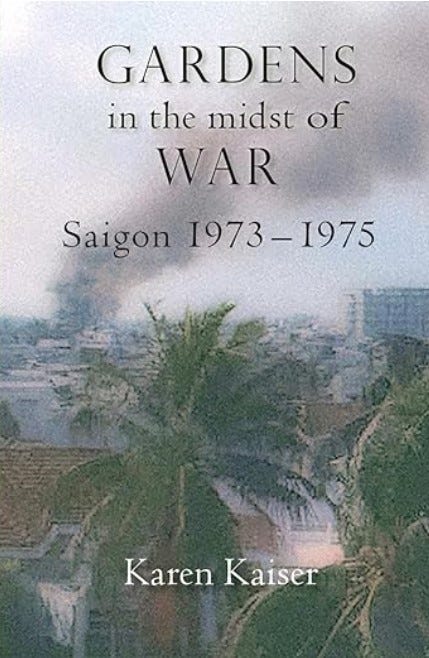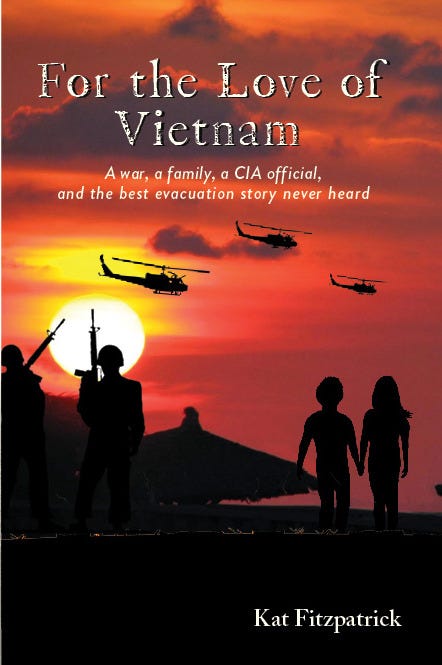As Karen Kaiser (author of Gardens in the Midst of War: Saigon 1973-1975 ) and I prepare to co-deliver Vietnam presentations, we’ve struggled with the question of whether audiences will care.
I take heart in the fact that, as pressing as it seems now, it’s not a new question.
In April 1974, my father, James E. Welch, CIA advisor to the South Vietnamese-run radio program Mother Vietnam, struggled with the question in a letter to his sister:
By the way, have you heard we still have a war going on here? Casualties are in the hundreds every day . . . And South Vietnam hasn't made one move toward invading North Vietnam. So where is the source of the battle?
And why should we care? Yeah! Why should I care about Kimberly [adopted daughter from Korea]? Why did JFK care about Berlin? Why have we cared about victims of earthquakes in Guatemala and elsewhere?
It is tiresome but unlike most of the American people, I still care very much about the people of South Vietnam . . . I intend to stick with it.
I still think we can win and will.
My father, sadly, was engaged in a losing battle. But now, half a century later, it seems less important that he was slated for failure than that he stuck with the convictions of his spirit.
It was that spirit that moved him to evacuate the staff and families of the radio program—paving the way for 1000 people to start a new life in the U.S.
It is that conviction of spirit that I turn to now.

When Karen and I discussed the question of why people should care, we found that the subtext was: Why should anyone care when so much is uncertain today?
And we found that the answer was right there in the question:
As mere, powerless civilians in the midst of a war zone, we had to navigate a great deal of uncertainty with little or no information.
We both agree that it was a moment-by-moment process. We both find ourselves surprised that we made it through.
But we did make it through. And now we have stories to tell:
Stories of soul-searching, doubt, and perspective
Stories of daily life, including servants, meals, and even laundry
Stories of the smells, the heat, the people, and the beauty
We hope you can help us tell these stories. Do you know of a school, club, or organization that would benefit from hearing our stories, in-person or over a video call? Please don’t hesitate to make the connection. More at Kat-Fitzpatrick.com.
On April 30th, Karen and I will commemorate the 50th anniversary of the Fall of Saigon together in Albany, N.Y. It will not be an anniversary celebration but a time to contemplate where we were all those years ago, who we have become, and what we hope for the future.
Do you feel called to commemorate the 50th in some way? Please share in the comments. I’d love to hear.
I’d like to finish up with another note from my father. This one was written in 1979 and was addressed to one of his South Vietnamese colleagues:
Although the war was lost, we did a very valuable service [at Mother Vietnam] and I think this lesson should not be lost to the next generation. Our radio could have tipped the balance if we had had more time. But that time was not given to us.
Time is rarely given to us; we have to take it.
I hope you’ll take the time now to consider in what way—small or large—you can lend some caring to the Vietnam Era and its 50th commemoration.
Thank you. Until next time,
Kat
Book Information
To arrange for a bulk purchase of books for a book club, please reply to this email.
Some ideas for bulk purchases:
using one or both of our books for a book club,
recommending them for a library collection purchase, or
recommending them to a teacher or professor for classroom use
Click here to purchase a copy of Gardens in the Midst of War: Saigon 1973-1975.
Click here to purchase For the Love of Vietnam: a war, a family, a CIA official, and the best evacuation story never heard.









